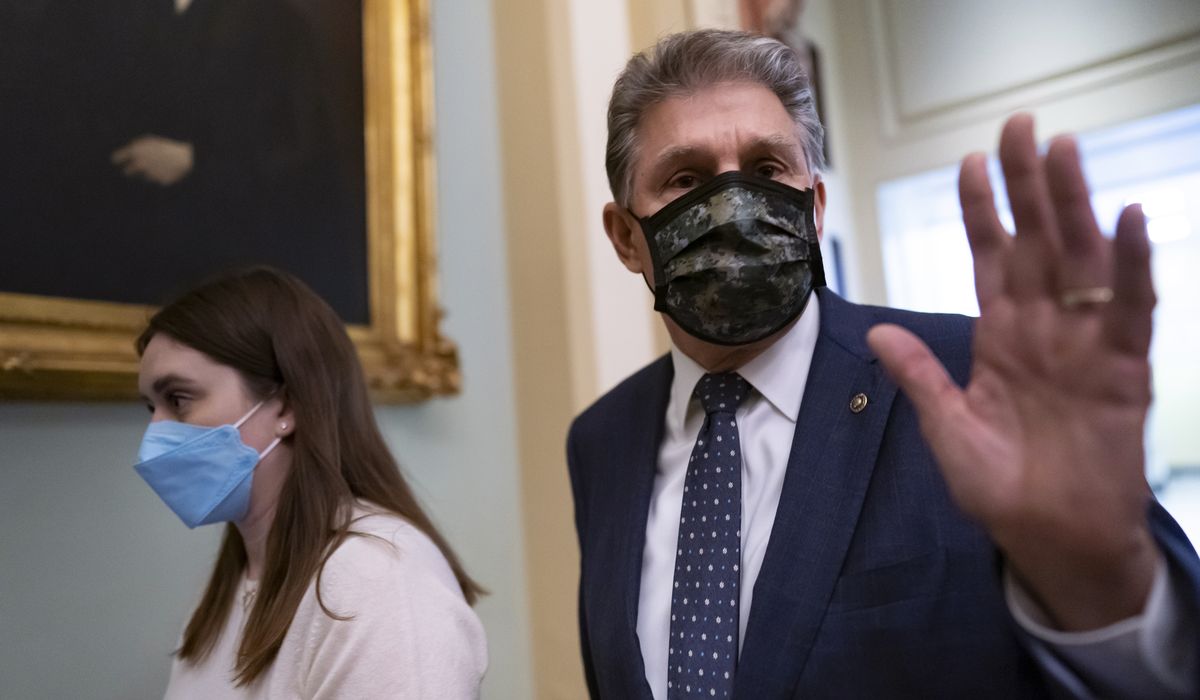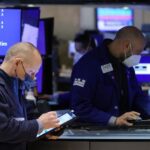
Sen. Joe Manchin III’s eagerness to repeal the Trump-era tax cuts has conservatives questioning the West Virginia Democrat’s claims that he’s an inflation fighter.
Economists say that Mr. Manchin’s support for hiking corporate and income rates across the board fails to square with his warning that an overheated economy will impose an “inflationary tax” on American workers, which was a top reason he gave for single-handedly killing President Biden’s $1.75 trillion social welfare and climate bill.
Experts note that even targeted tax hikes impacting corporations or individuals in specific income brackets will wind up impacting all sectors of the economy.
“To undo the Trump tax cuts would be to raise utility bills on everyone since energy companies will just pass off the corporate tax hikes to consumers in the form of higher prices,” said Grover Norquist, the president of Americans for Tax Reform. “That’s not just going to happen with utilities, it’s going to happen with groceries and major retail items, among other things.”
Mr. Manchin did not respond to a request for comment.
Tax-induced price hikes are likely to exacerbate the skyrocketing inflation that has plagued the country since Mr. Biden took office, according to some economists.
Earlier this month, the Department of Labor reported that consumer prices rose nearly 7% in November compared to this time last year. Overall, consumer prices have climbed at a rate higher than at any time since 1982.
Inflation has been broad enough to impact all consumers. Meat prices have climbed 16% in the last year, while the cost of clothing jumped 5%. Furniture prices are up 11.85% in part due to lingering effects of the coronavirus-induced supply chain crisis.
Mr. Biden and White House officials have been slow to respond, arguing for most of the year that inflation would be short-lived. Even after admitting such predictions were wrong, the president has continued to claim the worst is nearly over.
“It’s the peak of the crisis,” Mr. Biden said. “I think you’ll see it change sooner than, quicker than, more rapidly than it will take — than most people think.”
Mr. Manchin, for his part, has not bought such arguments. Earlier this month, Mr. Manchin pointed to the nearly 40-year-high inflation rate in explaining his opposition to Mr. Biden’s massive social welfare and climate bill.
“My Democratic colleagues in Washington are determined to dramatically reshape our society,” Mr. Manchin said. “I cannot take that risk with a staggering [national] debt of more than $29 trillion and inflation taxes that are real and harmful to every hard-working American at the gasoline pumps, grocery stores and utility bills with no end in sight.”
Despite that position, Mr. Manchin told colleagues that he would support blowing up the Trump-era tax cuts before the 2022 midterms. Mr. Manchin said the tax cuts were too heavily weighted in favor of the wealthy.
Fiscal hawks said Mr. Manchin’s desires to combat inflation and his advocacy for raising taxes are in direct conflict with each other.
“To say that you’re worried about inflation imposing a ‘tax’ on everyone’s paycheck and then turn around and back hiking taxes anyway doesn’t make sense,” Mr. Norquist said.
Others said that even if Mr. Manchin’s position in favor of scuttling the Trump tax cuts is misguided, it’s at least consistent with the senator’s long-held views.
Steven Roberts, the president of the West Virginia Chamber of Commerce, noted that Mr. Manchin voted against the 2017 tax reforms and has been vocal about his opposition.
“He’s said all along that he wants to revisit the tax plan, especially the corporate tax rate, because he thinks they went too far,” Mr. Roberts said. “I think everyone in West Virginia knows he’s against the Trump tax cuts at this point.”
He said his group, which represents thousands of businesses across West Virginia, is supportive of Mr. Manchin’s efforts to “slow” the Democrats’ agenda. Nevertheless, according to Mr. Roberts, that support does not extend to Mr. Manchin’s position on taxes.
“Now is not the time for hiking taxes given inflation and the lingering impact of COVID-19,” Mr. Roberts said. “West Virginia businesses want to do our part for the country, but tweaking the tax code to make us less competitive isn’t going to help anyone.”








